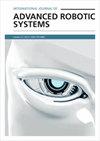Thermal error compensation method of truss robot beam structure based on mechanism and data drive
IF 2.1
4区 计算机科学
Q2 Computer Science
International Journal of Advanced Robotic Systems
Pub Date : 2023-03-01
DOI:10.1177/17298806231160878
引用次数: 0
Abstract
As the main supporting component of the truss robot, the thermal deformation of the beam often has a great influence on the overall thermal error of the truss robot due to its large span. In order to improve the thermal error prediction accuracy of long-span truss robot, a thermal error prediction method based on multiple linear regression and long short-term memory network is proposed based on mechanism and data drive. Firstly, the multiple linear regression model is used to predict the thermal error, and the prediction error data processing. Secondly, the long short-term memory network is established. In order to improve the performance of the long short-term memory network more effectively, an improved particle swarm optimization algorithm is proposed to optimize the hyper-parameters of the long short-term memory network. Finally, the improved particle swarm optimization–long short-term memory network is used to correct the prediction error of the multiple linear regression model. The experimental results show that the combined thermal error prediction model based on multiple linear regression and improved particle swarm optimization–long short-term memory algorithm has higher prediction accuracy than multiple linear regression model and long short-term memory network. The method has stable prediction accuracy and can provide a basis for thermal error compensation.基于机构和数据驱动的桁架机器人梁结构热误差补偿方法
梁作为桁架机器人的主要支撑部件,由于其跨度较大,其热变形往往对桁架机器人的整体热误差影响较大。为了提高大跨度桁架机器人的热误差预测精度,提出了一种基于机理和数据驱动的基于多元线性回归和长短期记忆网络的热误差预测方法。首先,采用多元线性回归模型对热误差进行预测,并对预测误差数据进行处理。其次,建立长短期记忆网络。为了更有效地提高长短期记忆网络的性能,提出了一种改进的粒子群优化算法对长短期记忆网络的超参数进行优化。最后,利用改进的粒子群优化-长短期记忆网络对多元线性回归模型的预测误差进行修正。实验结果表明,基于多元线性回归和改进粒子群优化-长短期记忆算法的组合热误差预测模型比多元线性回归模型和长短期记忆网络具有更高的预测精度。该方法预测精度稳定,可为热误差补偿提供依据。
本文章由计算机程序翻译,如有差异,请以英文原文为准。
求助全文
约1分钟内获得全文
求助全文
来源期刊
CiteScore
6.50
自引率
0.00%
发文量
65
审稿时长
6 months
期刊介绍:
International Journal of Advanced Robotic Systems (IJARS) is a JCR ranked, peer-reviewed open access journal covering the full spectrum of robotics research. The journal is addressed to both practicing professionals and researchers in the field of robotics and its specialty areas. IJARS features fourteen topic areas each headed by a Topic Editor-in-Chief, integrating all aspects of research in robotics under the journal''s domain.

 求助内容:
求助内容: 应助结果提醒方式:
应助结果提醒方式:


